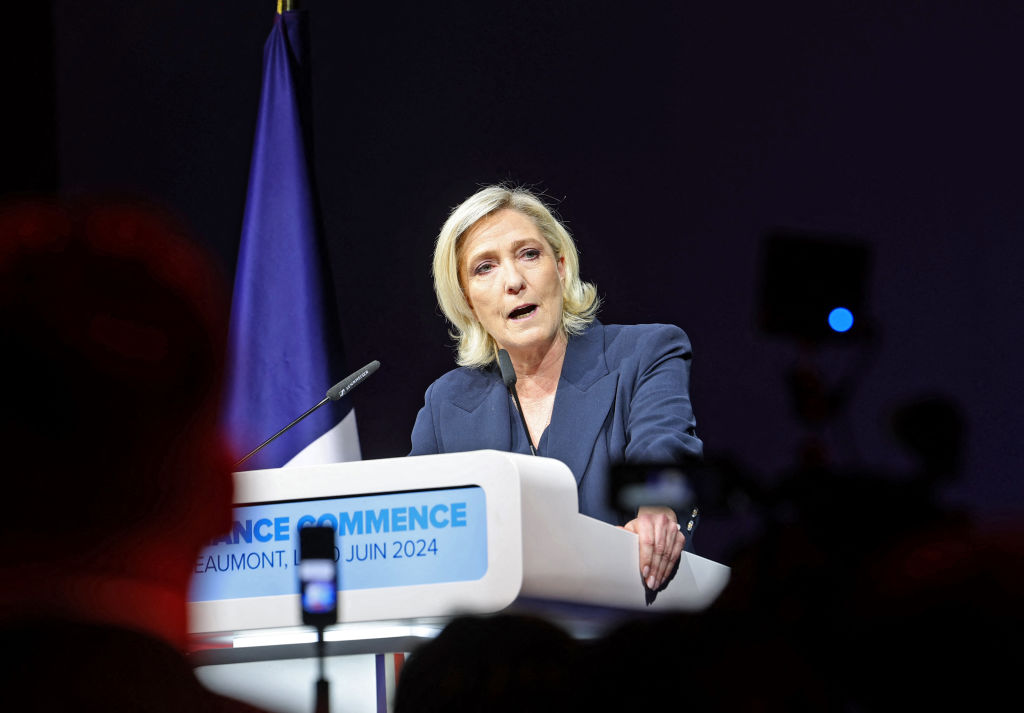Marine Le Pen was called a ‘bitch’ this week and threatened with sexual violence. It’s what passes for rap music these days in France. The threats won’t unduly concern Le Pen. She’s experienced worse. When she was eight, far-left extremists tried to kill her and her family with five kilos of dynamite. The Le Pens survived, but their Paris apartment didn’t.
Say what you like about the leader of the National Rally, and many do, but Marine Le Pen is a tough cookie. She was assaulted on the campaign trail during the 2017 presidential election, a minor setback compared to her subsequent disastrous performance in the television debate with Emmanuel Macron.
Fundamentally she is still the same Marine Le Pen as the one who became party leader in 2011
She was written off. Fini. Kaput. The End. ‘Marine Le Pen has no future so what next for the French right?’ was a typical headline of the time. That was in The Spectator, and written by the same writer scribbling these lines. Oh well, we all make mistakes. If you’re reading, Madame Le Pen, I apologise.
So here we are seven years later, and it is not Le Pen who is lost and humiliated; it is Emmanuel Macron. She, on the other hand, may be hours away from seeing her party become the most dominant force in the National Assembly. What a role model for women! Practically Hollywood-esque!
Of course, there will be no movie, no Time magazine front cover, no honorary degrees and no foreign honours, such as the Knight Grand Cross of the Order of the Netherlands Lion, one of 22 foreign gongs awarded to Angela Merkel during her time as chancellor of Germany. Le Pen didn’t even make Forbes’s recent list of the 100 most powerful women in the world. Barbie did, but then she doesn’t have what some like to call ‘problematical’ views.
Le Pen’s views were not a problem for the 13 million voters who endorsed her in the 2022 presidential election, or the 10.6 million who cast their ballot for the National Rally and their allies in the first round of the legislative elections last Sunday.
They endorse Le Pen’s view that immigration is out of control and a threat to the social cohesion of France, that Islamic extremism is a blight, and that the Republic is weak in confronting drug cartels and gangsters. They also endorse her view that France has ceded too much sovereignty to the European Union, and what Le Pen describes as her ‘economic patriotism’ to reindustrialise the country.
Le Pen’s éminence grise is Renaud Labaye, who is more important to her than Jordan Bardella, the 28-year-old president of the National Rally and the party’s poster boy. Labaye prefers the shadows to the limelight. A practising Catholic and the son of a military doctor, the 39-year-old is the most influential of Le Pen’s inner circle, known as ‘Horaces’ – a right-wing think-tank composed of civil servants and businessmen named after the Horatii brothers of Roman legend.
The Horaces rallied to Le Pen after her 2017 debate debacle, an experience that left her profoundly dispirited. When she finally re-emerged in 2018 to declare that she was ‘committed to a profound reform of the National Front’, she and the Horaces embarked upon their quest to make the party electable.
First, the Horaces rebranded the party, changing its name to the National Rally. Then they began rebranding Le Pen. It was a two-fold strategy. First, they wanted to soften Le Pen’s image with the general public, making her more ‘mumsy’. She gave interviews in which she discussed her enthusiasm for gardening and her love of cats. The harder part was to make her more ideologically palatable to the upper echelons of society, and this was where Renaud Labaye has been invaluable.
Labaye, whose sartorial style is described as ‘très British’, comes from an ‘elite’ background and was a civil servant in Paris before joining the National Rally. He inhabits their world. Le Pen, on the other hand, the granddaughter of a fisherman and the daughter of a paratrooper, has always harboured a visceral loathing for the conservative bourgeoisie, perhaps attributable to an inferiority complex.
Labaye has helped Le Pen lose this complex, and the results have been dramatic. In last week’s first round, the RN finally broke through the cordon sanitaire that had been in place for decades: 31 per cent of retirees voted for the party (up from 12 per cent in the 2022 election); 32 per cent of women (up from 17 per cent); 32 per cent of the most affluent (compared to 15 per cent in 2022); and among senior civil servants the party doubled its score in two years from 11 per cent to 22 per cent.
Some things haven’t changed, however. On Thursday, Le Pen was interviewed by CNN and she replied to all Christiane Amanpour’s questions in French. She is, by her own admission, someone who speaks English ‘very badly.’ That’s part of her appeal to her core voters. She may have worked on her image a little in recent years, but fundamentally she is still the same Marine Le Pen as the one who became party leader in 2011. She is not for turning.








Comments